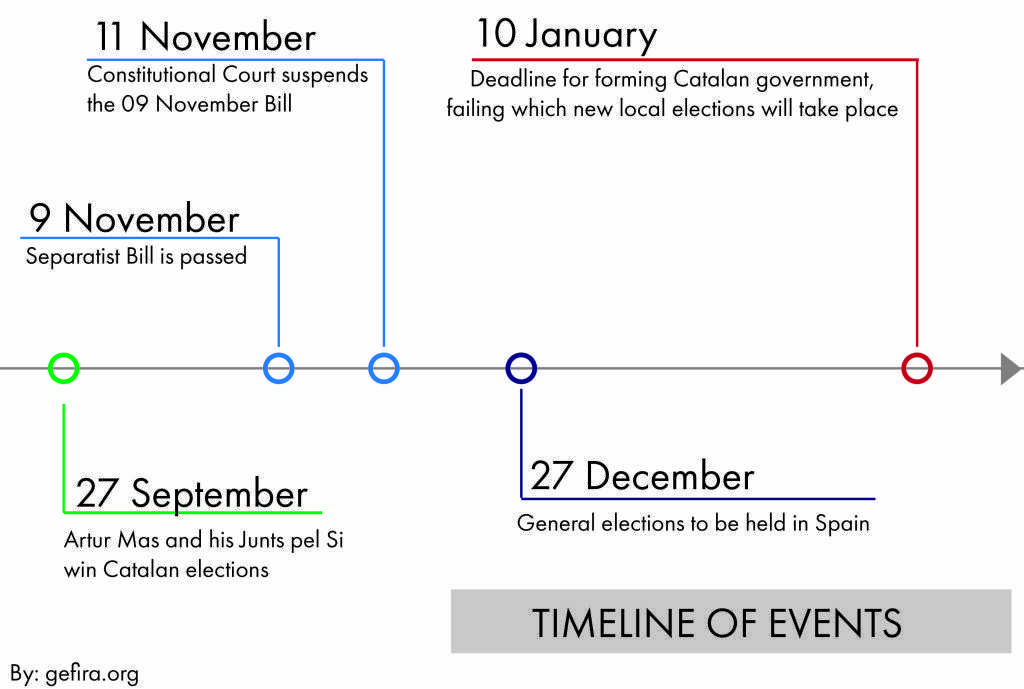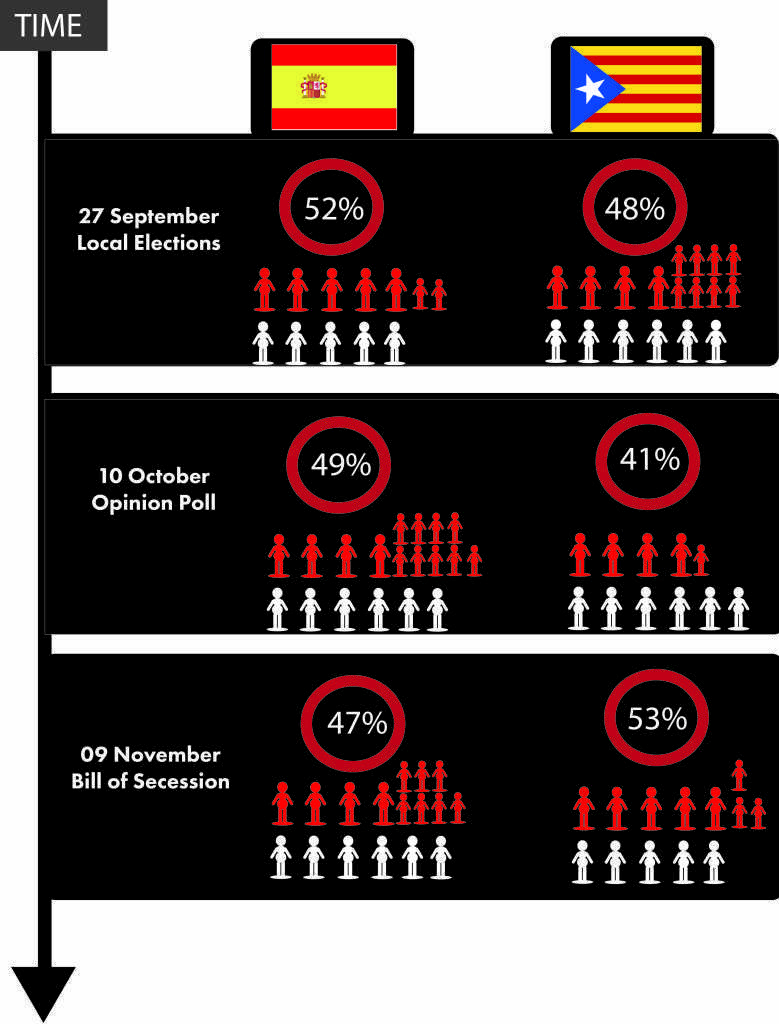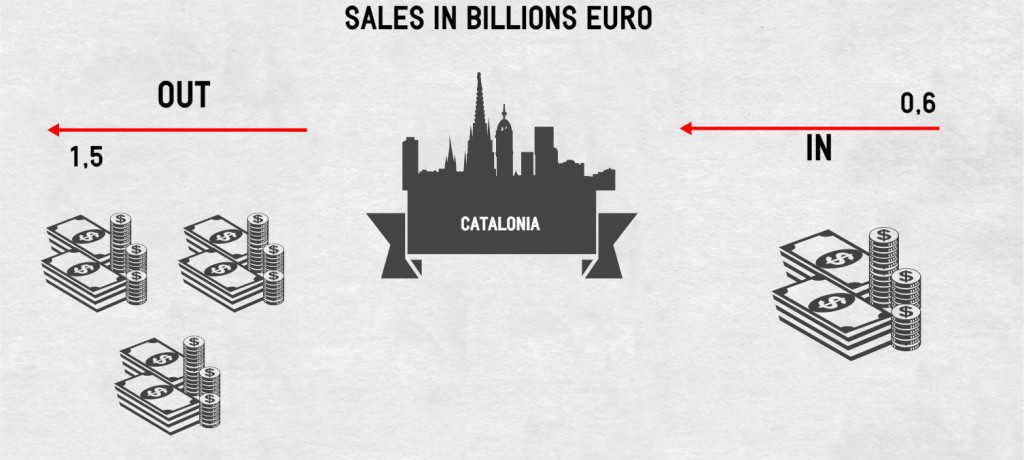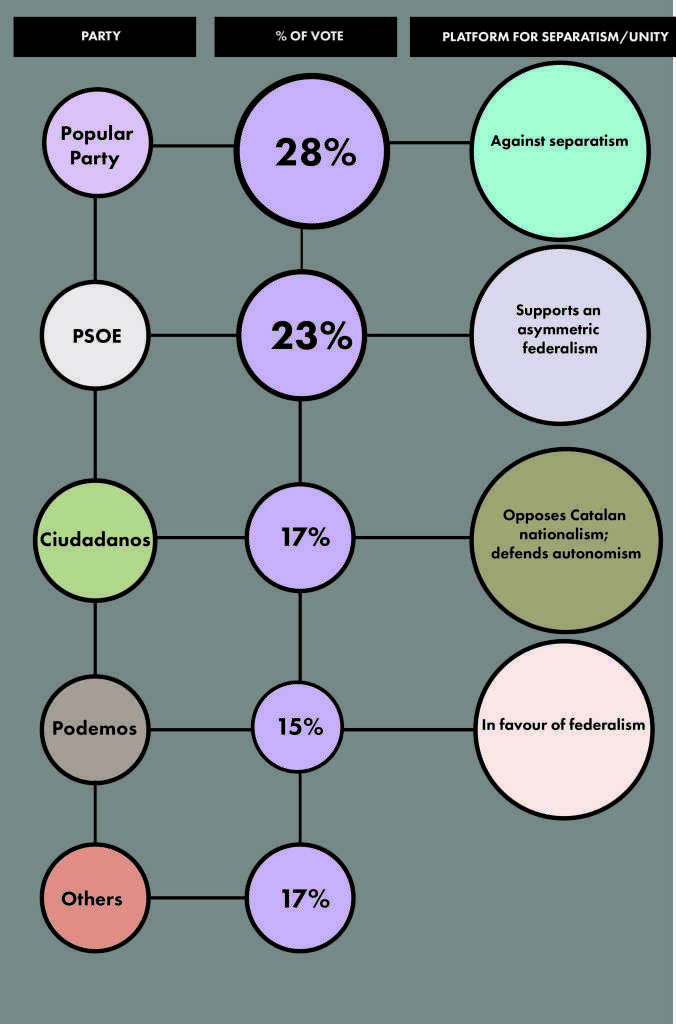On September 27 the coalition Junts pel Si (Together for Yes) led by Artur Mas won the local election in Catalonia. Its political platform promised to work towards Catalonia’s independence of Spain. On November 9 the Catalan parliament passed a separatist motion: the legislators were tasked with
(i) drafting the Catalan constitution,
(ii) designing the Catalan social security system and
(iii) creating the Catalan treasury1.
Within the meaning of the same motion the Spanish Constitutional Court no longer had jurisdiction over Catalonia. In the wake of these events the Spanish government headed by Mariano Rajoy appealed with the Constitutional Court to suspend the Catalan motion and to issue a warning to 29 top Catalan politicians. On November 11 the Constitutional Court ruled as was expected: the bill of November 9 was suspended and the top Catalan politicians were duly given a warning. The court has a further 5 months to rule over the case. Before that, on December 20 Spain will have a general election whose results may greatly affect the political process in Catalonia; so much so that the go-away region may have its own elections in case acting prime minister Artur Mas fails to form a government by January 10.
On November 11 the Constitutional Court ruled as was expected: the bill of November 9 was suspended and the top Catalan politicians were duly given a warning. The court has a further 5 months to rule over the case. Before that, on December 20 Spain will have a general election whose results may greatly affect the political process in Catalonia; so much so that the go-away region may have its own elections in case acting prime minister Artur Mas fails to form a government by January 10.
Support for secession
Though Junts pel Si, the coalition that opts for separatism, won the September 27 elections, it did not win the majority of votes (48%). Two weeks after the elections the October 10 opinion poll revealed a falling number of separatists in the province (41%). This does not reflect the distribution of parliamentary votes cast on 9 November, a day when the separatist motion was passed: those in favour had a 53% majority2. The attitude towards the question of independence seems to be fickle, with a difference of 12 percentiles within some six weeks, granting the data from the polling booths, public opinion surveys and parliamentary vote can be compared. This inconstancy may be put down to a number of factors. Catalan acting PM Artur Mas might be one of them.
Friction in Barcelona
Artur Mas has difficulties forming a government. The CUP (Popular Unity Candidacy), his separatist coalition partner, does not want to make it easier for him. The acting prime minister has become an unpopular politician in the region. As many as 71% of Catalans do not want to see him serve another term3. His plans to make Catalonia an independent country may fall through. The opposition is made up of pro-unionist parties, such as the Catalan Socialists, who prefer more autonomy but no separation, or the Catalunia Si que es Pot (Catalonia Yes We Can), who would like to slow the separatist process down and put the whole idea to the public vote. If Artur Mas fails to form his government by January 10, there will have to be next elections and the whole balance of political powers may undergo a significant change, especially when coupled with the results of the general elections slated for December 20.
Friction between Madrid and Barcelona
The November 9 motion passed by the Catalan parliament, and especially the wording stating that the Constitutional Court no longer had legitimacy over Catalonia, made the Madrid government spring to action. PM Mariano Rajoy requested the said Constitutional Court to deal with the case. On the urging of the authorities the court ruled that the November 9 motion be suspended, and it issued a warning to 21 top Catalan politicians (including Artur Mas) of taking any further action4.
The reaction of the business
Since 2012, when the independent movement was beginning to gain traction, businesses started to leave Catalonia, many of them for Madrid. This year alone almost 700 companies with the combined sales of over €1.5 billion departed from the region. This can hardly be offset by the arrival of more than 100 businesses in the province with the combined sales of approximately €0.615 billion5. Even before the September 27 elections several Catalan companies had announced they would reconsider staying in the region if Junts pel Si won. Entrepreneurs are afraid of unrest, the resultant legal changes and all the other circumstances accompanying a possible separation.
December 20 Elections
According to the latest survey6 it is the ruling Popular Party (PP) headed by Mariano Rajoy that is expected to win (28%), followed by the Spanish Socialist Worker’s Party (PSOE) (23%), Ciudadanos (Citizens party) (17%) and Podemos (“We can”) (15%). Of these none voices the opinion in favour of regional separatism, though they may support various forms of federalism and various degrees of autonomy.
1 Catalan parliament passes motion declaring start of secession process Source: El Pais 09-11-2015
2 Majority of Catalans oppose the independence declaration bill — poll Source: El Pais 30-10-2015
3 Majority of Catalans oppose the independence declaration bill — poll Source: El Pais 30-10-2015
4 Constitutional Court votes to suspend Catalan independence process Source: El Pais 12-11-2015
5 Hundreds of companies leaving Catalonia over separatist drive Source: El Pais 23-11-2015
6 Ciudadanos gana terreno y Podemos vuelve a caer justo antes de la campaña Source: ABC Espana 02-12-2015






